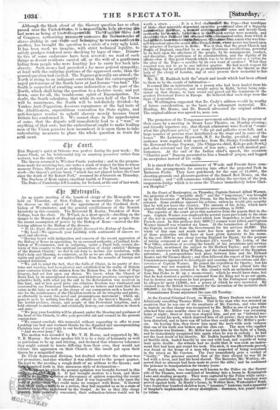Although the black cloud of the Slavery question has so
often passed over the HnitedoCtates, it is impossiblesio help viewing ,tM last news as being at leastr,disagrotsable. Thelieugittre Sldve Act of Congress, authorizing snmmai measures for the surrender slaves abiding in ont,-Stitt4f- and -heltaip,ing•to -ownsta:reside another, has brought the question to a crisis of a very ugly It has been used, we imagine, with strict technical legality, to satisfy grudges rendered more shocking by lapse of time. Dom do ties of some endurance have been severed : we read of such things as decent residents carried off, or the wife of a gentleman hiding from people who were hunting her to carry her back into slavery. Such scenes had provoked a far more general sympathy, at least with the outlying portions of the oppressed caste, than the general question had excited. The Negroes generally are armed ; the North is rising to an indignant conviction that the extravagantly- urged pretensions of the South have at last become "too bad." The. South is suspected of awaiting some indiscretion on the part of the North, which shall bring the question to a decisive issue, and put down, once for all, the troublesome spirit of Emancipation. doubt, the South calculates, that while its own half of the Union will be unanimous, the North will be indefinitely divided—by Yankee Anti-Niggerism, decorous repugnance at the had taste of the Abolitionists, superstitious veneration for State rights, and anti-foreigner resolve to uphold slavery merely because Great Britain has condemned it. We cannot share in the apprehension of some, that the dispute will immediately lead to a " war," or anything of that sort ; but the embroilment ought to make leading men of the Union perceive how incumbent it is upon them to take unhesitating measures to place the whole question in train for settl:ment.


























 Previous page
Previous page